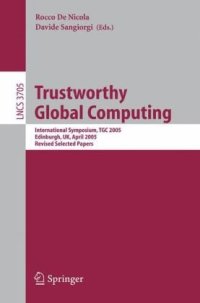
Ebook: Trustworthy Global Computing: International Symposium, TGC 2005, Edinburgh, UK, April 7-9, 2005. Revised Selected Papers
- Genre: Education // International Conferences and Symposiums
- Tags: Software Engineering, Computer Communication Networks, Programming Techniques, Operating Systems, Programming Languages Compilers Interpreters, Logics and Meanings of Programs
- Series: Lecture Notes in Computer Science 3705 : Theoretical Computer Science and General Issues
- Year: 2005
- Publisher: Springer-Verlag Berlin Heidelberg
- Edition: 1
- Language: English
- pdf
This book constitutes the thoroughly refereed post-proceedings of the International Symposium on Trustworthy Global Computing, TGC 2005, held in Edinburgh, UK, in April 2005, and colocated with the events of ETAPS 2005.
The 11 revised full papers presented together with 8 papers contributed by the invited speakers were carefully selected during 2 rounds of reviewing and improvement from numerous submissions. Topical issues covered by the workshop are resource usage, language-based security, theories of trust and authentication, privacy, reliability and business integrity access control and mechanisms for enforcing them, models of interaction and dynamic components management, language concepts and abstraction mechanisms, test generators, symbolic interpreters, type checkers, finite state model checkers, theorem provers, software principles to support debugging and verification.
This book constitutes the thoroughly refereed post-proceedings of the International Symposium on Trustworthy Global Computing, TGC 2005, held in Edinburgh, UK, in April 2005, and colocated with the events of ETAPS 2005.
The 11 revised full papers presented together with 8 papers contributed by the invited speakers were carefully selected during 2 rounds of reviewing and improvement from numerous submissions. Topical issues covered by the workshop are resource usage, language-based security, theories of trust and authentication, privacy, reliability and business integrity access control and mechanisms for enforcing them, models of interaction and dynamic components management, language concepts and abstraction mechanisms, test generators, symbolic interpreters, type checkers, finite state model checkers, theorem provers, software principles to support debugging and verification.